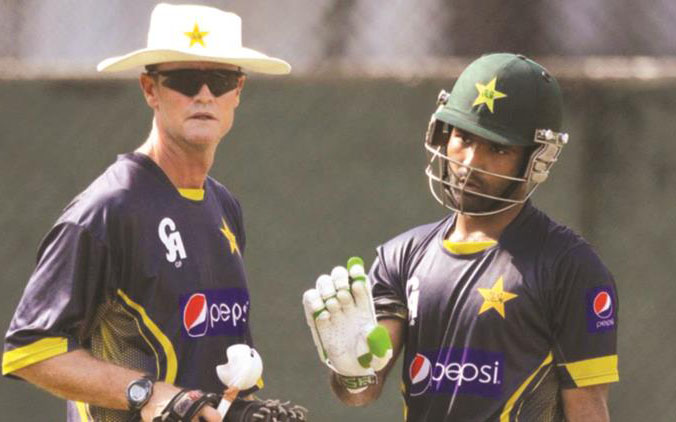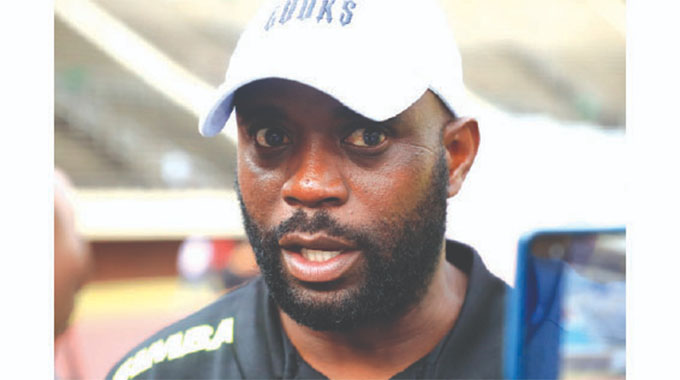The untold Zim touch to Pakistan’s success


THE MASTER AND PUPIL. . . Pakistan’s specialist batting coach Grant Flower (left), seen here working with Asad Shafiq, has been a key factor in helping the Asian giants become a successful side
Robson Sharuko Senior Sports Editor
PAKISTAN wrote one of world sport’s greatest success stories by defying the odds to win the 2017 International Cricket Council Champions Trophy at the Oval in London on Sunday and hidden, somewhere, in that remarkable triumph was the priceless Zimbabwean contribution to that cause.
Coming into the tournament with the least ranking of all the participating teams, eighth in ODI cricket in the world, Pakistan made a mockery of the rankings to recover from a first-game battering and crush bitter rivals India in the final.
Along the way, they also swept away South Africa and thrashed hosts England in the semi-finals before a stunning all-round show in the final annihilated India with none of their four victims managing to score more than 236 runs in their innings.
The Pakistan cricketers were feted like kings, on their return home, as their cricket-mad nation gave them a fitting heroes’ welcome as the fans celebrated the country’s first world 50-overs tournament success story since 1992. “Hopefully this win, everyone will remember — not today, not tomorrow, but for a very long, long time,” said Pakistan captain Sarfraz Ahmed.
“Now we are the champions, hopefully this win will boost Pakistan cricket and hopefully all playing nations is coming to Pakistan.” Coach Mickey Arthur also touched on the absence of international cricket in Pakistan since some militants attacked the Sri Lanka team bus in Lahore in 2009 forcing virtually all the world’s teams not to tour that country for security reasons.
“I’m sure that the nation of Pakistan is really happy tonight — they deserve it. You talk about our players not playing at home but also the fans not identifying with heroes because they just don’t see international cricket,’’ said Arthur. ‘’That’s massive. So let’s hope that this really kick-starts that momentum in Pakistan again.”
What wasn’t mentioned, though, was how Zimbabwe played a helping hand in laying the foundation for Pakistan’s sensational triumph. In May two years ago, the Chevrons broke ranks with their Test playing counterparts when Zimbabwe became the first major cricket playing country in the world to tour Pakistan for three ODIs and two Twenty20 Internationals.
All the matches were played at the Gaddafi Stadium in Lahore, the irony of the hosting venue and city — where those militants attacked the Sri Lanka team bus in 2009 —not lost on the watching world.
All the matches attracted capacity crowds with a number of Pakistan players who would feature prominently in the country’s 2017 ICC Champions Trophy success — skipper Sarfarz, fast bowler Junaid Khan, Babar Azam, Shoaib Malik, Mohammad Hafeez and Azhar Ali — playing key roles in their country’s success in both the Twenty20s and the ODIs against Zimbabwe.
The matches were competitive with Pakistan winning the first Twenty20 International by five runs, with three balls to spare, while they won the second T20 by just two wickets after chasing the Chevrons’ 175-3.
Malik scored a century in Pakistan’s 375 total in the first ODI and, in reply, Elton Chigumbura hammered 117 and Hamilton Masakadza scored 73 as the Chevrons reached 334-5 in their reply while in the second ODI an unbeaten century by Sikandar Raza and Chamu Chibhabha’s 99 powered Zimbabwe to 268-7 before the hosts chased that in 47.2 overs, reaching 269-4 in their response.
The third ODI was washed out with the Chevrons having reached 68-0 in reply to Pakistan’s 296 with Hafeez top-scoring for the hosts with his 80.
Prime Minister Nawaz Sharif even wrote a letter to President Mugabe thanking Zimbabwe for their decision to tour his country. “The recent tour of the Zimbabwe cricket team to Pakistan was a resounding success. I am sure you have been informed of the tremendous enthusiasm of the Pakistani fans who packed the stadium on all the matches waving not just Pakistan flags, but also those of Zimbabwe,’’ Nawaz said in his letter.
“Numerous fans were carrying banners thanking Zimbabwe for sending the team. “Your Excellency, I am aware that a large part of the credit for this successful cricket series belongs to you. The Government and people of Pakistan are grateful to you for your leadership, vision and solidarity with Pakistan and Pakistan cricket for helping make this entertaining cricket contest a reality.
“It was the first time in six years that Pakistan fans were able to watch their team play on Pakistan soil. It was also the first time for some Pakistani cricketers to play international cricket before a home crowd.
“The successful series has now paved the way for Pakistan to host other teams and to be integrated into the mainstream of international cricket. The role that Zimbabwe played in making that happen shall never be forgotten.
“Your Excellency, I would also like to avail of this opportunity to convey through you our appreciation and gratitude to the Zimbabwe Cricket board for organising this tour and going ahead with it despite some last minute hitches. Please accept, Your Excellency, the assurances of my highest consideration.”
Exactly a year before the Chevrons arrived in Lahore, the Pakistan Cricket Board had turned to a Zimbabwean cricket legend, Grant Flower, hiring him as their national team’s specialist batting coach.
Just a year into the job, Pakistan’s batting average improved to 43 in Tests, the best among all the Test-playing nations, with Flower being credited with the improvement.
“Pakistan’s batting had been one of their major weaknesses earlier and the PCB had turned to former captains Inzamam-ul-Haq, Javed Miandad and Zaheer Abbas to bring about improvements,’’ ESPNCricinfo noted.
“With Flower’s appointment, Pakistan witnessed considerable improvements in their batsmen. Pakistan’s average runs per wicket was just 28.89 between January 2012 and February 2014.
“Since Flower’s appointment in July 2014, it rose to 43.82. Under him, Pakistan batsmen have converted 48.43% of half-centuries into centuries — 31 hundreds out of 64 50-plus scores — which is the most among all teams by a distance. South Africa and Australia are next with under 41% conversions.’’ “At the start I wasn’t sure what to expect and I was quite apprehensive,” Flower said. “But it has become exciting and I get to work with some great players with great records.”
PCB chairman Shaharyar Khan revealed the feedback they have been receiving about Flower’s influence has been good after the Zimbabwe coach’s contract was extended by another year in July last year.
“Everyone we have spoken to says the batting coach is doing well. “But obviously he (Grant) has been there for nearly four years and we want to see more results,” said Khan.










Comments